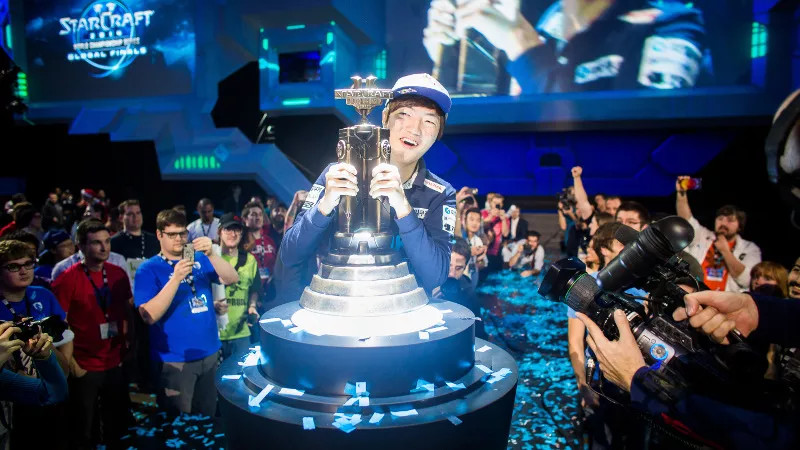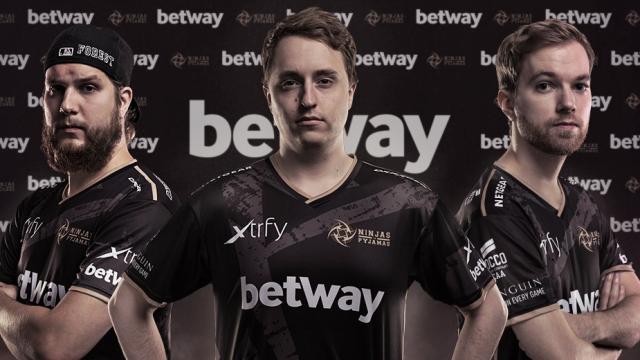Spend an afternoon at a Top 8 Finals of any fighting game tournament, and you will find there is a robust side-betting culture in esports. Pseudo-gambling activities such as “skin wagers” in Counter-Strike have been a part of esports culture from the beginning, and fringe sites such as XLBet have included StarCraft games next to MLB games.
But widespread casual betting like there is on traditional sports hasn’t come to esports yet. That could all change with the recent US Supreme Court decision overturning America’s ban on sports gambling – New Jersey’s bizarre ban on esports betting notwithstanding.
The Ninjas in Pyjamas Counter-Strike team partnered with Betway in 2016. Image: Betway
Teams in games such as Counter-Strike (like Ninjas in Pyjamas) are already sponsored by websites such as Betway and Bet365, and legalisation could be just what is needed to take the negative stigma off of esports betting and open the industry to more suitors in America, where leagues such as Overwatch League and the League of Legends Championship Series have prohibited teams from courting betting websites as team sponsors.
The potential implications for the industry are huge, and not just because of the vast amounts of money that might be wagered on esports on a daily basis.
Gambling and competitive enterprises have always had tense relationships. Despite the fact that the National Football League officials like former security Milt Aherlich have described the potential public relations hits from gambling scandals as “the hydrogen bomb of the league”, the NFL and its absurd multi-billion dollar revenues would not be possible without the robust gambling world that surrounds the game of football.
The potentially enormous amount of money that could pour into esports as a result is both an exciting and scary prospect for those in the esports world.
It isn’t just the cash that would be wagered – lucrative sponsorships from gambling portals could lift up events ranging from Overwatch League to major fighting game tournaments and everything in between.
Estimates of the size of the legal sports gambling industry in America check in at at least $US67 billion ($91 billion); if esports gambling turns out to be even a fraction of that size, it would be a monumental shift in professional competitive gaming.
Esports is ripe for a huge variety of wagers beyond just simple point spreads or over-unders.
DraftKings already offers fantasy bets on League of Legends. Online gambling sites that cater to bettors who live in places where it’s legal have added esports contests in recent years for games with well-established competitive scenes, such as League of Legends and Counter-Strike.
Additionally, games such as League or DotA could add wagering into spectator modes and take advantage of the lightning quick nature of esports, in which many games – and thus many potential wagering opportunities – are completed in the course of just a few hours.
The rapid ascendancy of the MOBA in American esports, the rise of university esports scholarship programs, and the Overwatch League have all added to the status of esports as A Thing to Watch.
Major league sports owners such as Robert Kraft have purchased esports teams, Morgan Stanley is writing reports on them, and ESPN is perpetually just about to dip another toe in the esports pool.
The esports industry – and an “industry” is absolutely what it has become, for good and ill – is churning along, and if we trust Morgan Stanley’s calculations, it could be worth $US1.5 billion ($2 billion) by 2020 as it emulates “the business models of major league sports, complete with sponsorships, advertising, media rights, ticket sales, and merchandise”.
But, there’s that hydrogen bomb thing.
Major American sports have somehow only had the one certainly fixed major championship – the 1919 Black Sox scandal. But the possibility that that represents has haunted the sports world since, and dictated a century of decisions.
Another scandal like this, the logic went, would irreparably destroy fan confidence in the integrity of competition.
As professional sports became more and more mainstream, any connection to the seedy underbelly of gambling (and in turn its frequent connections to organised crime) also threatened to blow up the extremely lucrative relationships sports leagues and teams had built with governments, sponsors and broadcasters.
Even if the role gambling had in building these leagues’ popularity was undeniable, the leagues couldn’t even acknowledge gambling, much less throw institutional support behind it.

Life with the 2014 StarCraft World Championship Series trophy at BlizzCon. Photo: Blizzard Entertainment
Esports has already had its own major match-fixing scandals, mostly in Korea, where StarCraft is a national institution and legalised betting is already a part of the esports scene.
Lee “Life” Seung Hyun, a 10-time StarCraft 2 champion, received ₩70 million ($84,900) to throw two matches in 2015. His winnings across the entire year of competition, throughout which he was one of the game’s top players, totalled around $149,000. He made over half that across just two matches.
And just this March, a StarCraft: Remastered player was arrested for taking a ₩4.5 million ($5450) bribe to throw a quarterfinal set at an exhibition tournament held by G-STAR in late 2017. His winnings for placing in the 17th-22nd portion of the bracket earned him under $400.
The calculus here is clear.
American sports history is an ideal model for what actually fuels the kind of sport-destroying scandal Aherlich and other pro sports figureheads have been concerned about since the very beginning. And that history makes it clear that the animating question shouldn’t be, “Will gambling destroy esports?”
It should be, “Will players be given enough of these new profits that they aren’t given incentives to throw?”
In every gambling scandal in early American sports history, the connective thread is that the players in question were given enough money that the decision not to fix games – or even, in one case, to merely associate with gamblers – was a financial no-brainer for the athletes.
Black Sox players were offered five-figure sums at a time when the reserve clause made it impossible to secure a raise, even at a superstar level.
Star Detroit Lions lineman Alex Karras (who may be better known for his illustrious acting career) was forced to sell his stake in a Detroit bar because it was connected to known gamblers. He told Dan Moldea, author of the 1989 book Interference: How Organised Crime Influences Professional Football:
“The NFL asked me to leave the bar because of the unsavoury characters who walked into the bar. I said, ‘Fine, I’ll do that, just as long as you don’t let the unsavoury characters come into the stadium.’ The NFL did not reply to that. I never worried about whether the league gave me permission or not. I was making nine thousand dollars a year playing football and eighteen thousand with the bar. It didn’t make much sense to leave the bar to go play football.”
The dynamics haven’t really changed today. Match-fixing scandals simply do not appear in top-level professional sports since the advent of free agency – players negotiating their own salaries – in the 1970s and 1980s.
Allowed to negotiate on an open market, player salaries swiftly ballooned to six-and-seven figure sums, and all of a sudden, it was impossible for any enterprising con man to find an athlete willing to go along with his match-fixing schemes.
Even for a minimum salary NFL player, who is going to compete with $US400,000 ($541,194) yearly, plus union benefits?
Instead, the kind of match-fixing scams that dominate contemporary headlines are in third or fourth-division soccer leagues overseas, tennis matches involving players ranked outside the top 100 in the world, or mid-to-low-major NCAA basketball teams.
What’s in common here? All of these athletes, just like Life, are good enough to turn their talent into profit, but none are great enough to turn it into a sustainable career, and for them, there is simply not enough to lose to disincentive match fixing.
It’s obvious enough, but rarely said that pro sports work as discrete industries because they offer opportunities to their players that those players can’t or probably won’t get elsewhere. (That, and their federally protected monopolies.)
Thousands of high school and university students play football for the enjoyment of the game, of course, just as I might boot up Rainbow Six: Siege to kill some time on a quiet night or to hang out with my friends.
But thousands more continue playing because they know that they have a shot at making a livelihood out of the game itself.
Before the endorsement deals, broadcasting rights, merchandising and the rest, pro sports offer the one thing that anyone needs to put years of their life into one hyper-specific bucket: The promise of even a potential salary. Not the jackpot of an endorsement, mind you, but a predictable check and a stable career.
This isn’t going to be as big of an issue for an entity auch as Overwatch League, in which teams are bankrolled by multi-millionaires (the entry fee was $US20 million [$27 million]) and lucrative sponsorships from the likes of Intel and HP and are able to sustain minimum salaries of $US50,000 ($67,649) a year, with benefits, as a result.
Similarly, League of Legends players in the North American League Championship Series (LCS) average $US320,000 ($432,955) salaries, much of which can be attributed to the huge franchising fees recently instituted in LCS.
But for esports gambling to grow, it needs games, and there’s no reason why anything from Dragonball FighterZ to StarCraft to Rocket League to NBA 2K should be exempt.
Fighting games, as an example, offer substantial betting opportunities, with triple-digit entrant major tournaments for many games happening seemingly every weekend.
Everybody understands that at esports’ grassroots levels, people from the players to the organisers to the viewers are taking time out of their lives and, at best, breaking even to put on a show for a community.
But when gaming moves from avocation to vocation, from hobby to work, or even when the lines start to blur, it becomes impossible to ignore the kind of calculation somebody like Sky might make.
When one thrown match can reap the same spoils as 20 tournaments – and the days grinding in-between them, with no guarantee of a payout unless you’re on your best form and/or getting the RNG in your favour – where is the incentive to say no?
Why care about a ban when the payday might be more than you might make in the rest of your competitive life?
As long as esports continues to draw more and more eyeballs and competitors, a robust betting scene seems inevitable. Besides the fact that there’s too much money in it, there’s also too much interest.
Sports went through these growing pains 100 years ago and has a clear lesson to offer esports.
If esports organisations want to avoid the legal issues and the embarrassment that can come with gambling scandals, the path is clear: Pay the players, and you’ll have nothing to worry about.

Comments
One response to “To Eliminate Match-Fixing In Esports, Pay The Players More”
Not all people break the ‘law’ because they need to, some just do it, because they can, because they want to. Paying them better might help some turn away from badness, but not all of them. Every day people all over the world dont get paid enough for their jobs, or what they think they are worth. Sure some turn to crime but not all do. Even some of those who earn HEAPS of money are still criminals (of varying degree) because it is just their nature.
I’m sorry, the answer AT THIS POINT is to give these fairies MORE money??
when they do something professional that members of their audience can’t do better than them then they get the real athlete cash. until then they should be getting less than minimum wage for sure
Because it’s not an issue in cricket, football or boxing.